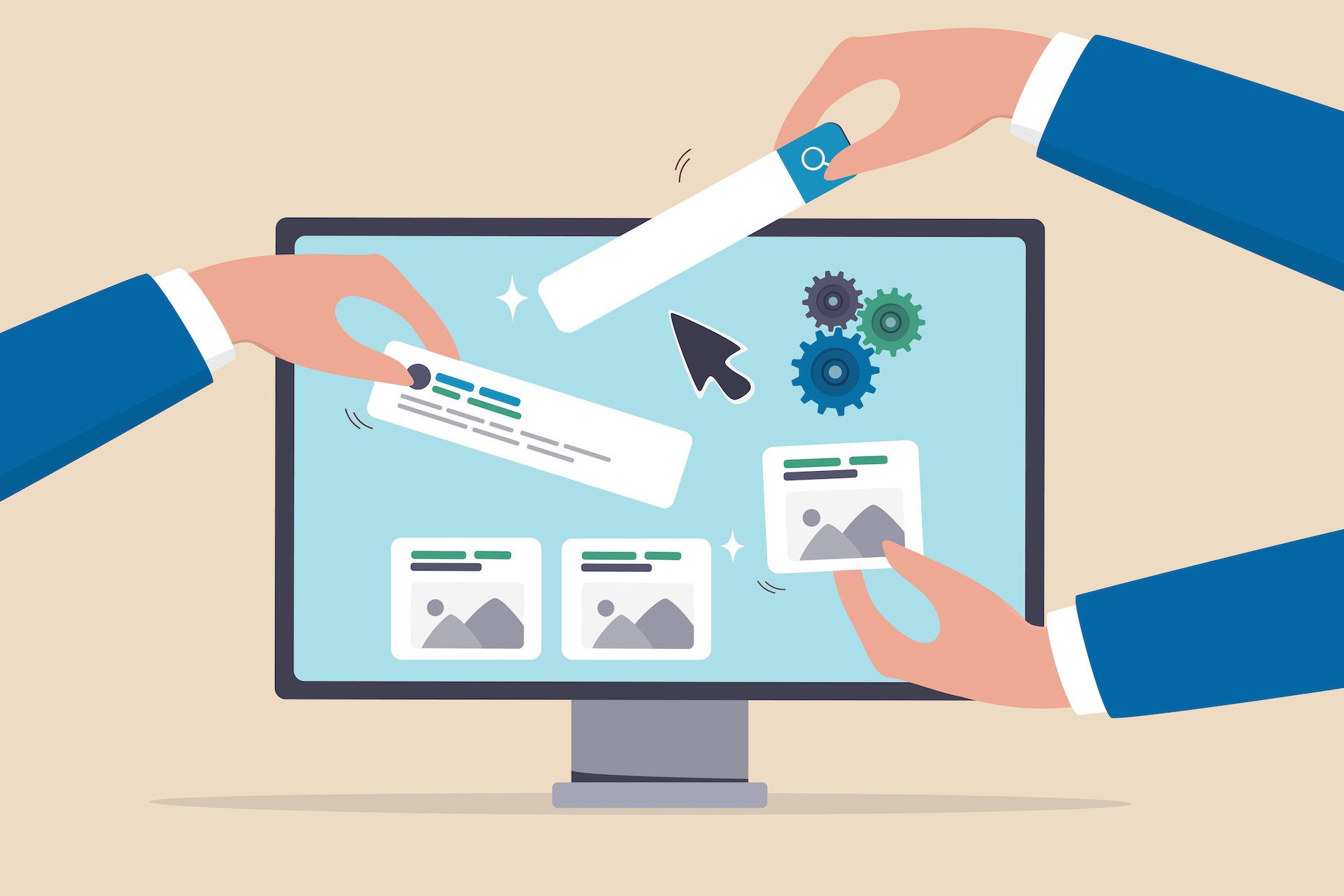How To Map the B2B eCommerce Customer Journey
Map the B2B eCommerce customer journey to create more personalized experiences and optimize for conversions.
6 min read
 Jeff Zoldy
:
August 30, 2024
Jeff Zoldy
:
August 30, 2024

Businesses are under constant pressure to deliver seamless and personalized experiences to their clients. Unlike B2C eCommerce, where uniformity can sometimes suffice, B2B eCommerce requires a more tailored approach to meet the diverse needs of specific clients. This is where eCommerce customization comes into play.
Customizing an eCommerce platform to suit the specific requirements of B2B transactions is not just a competitive advantage — it is a necessity. This article delves into what eCommerce customization entails, why it is critical for B2B businesses, and provides actionable insights on how to begin customizing your eCommerce site.
The term eCommerce customization refers to the process of tailoring an online store to meet the unique needs of a business and its customers. This can include modifying the design, layout, and functionality of the eCommerce platform to align with specific business goals, customer requirements, and market demands.
Customization can range from basic changes like adjusting the color scheme and branding to more advanced modifications such as integrating specialized software, creating custom workflows, or developing unique features that enhance the user experience.
B2B transactions are inherently more complex than B2C transactions. They often involve larger order volumes, longer sales cycles, multiple decision-makers, and the need for customized pricing, catalogs, and payment terms. Customization in B2B eCommerce is crucial because it allows businesses to address these complexities and provide a more personalized and efficient shopping experience for their clients.
B2B clients often have specific requirements that go beyond what a standard eCommerce platform can offer. This could include custom pricing models, bulk ordering capabilities, or tailored product catalogs. By customizing your eCommerce platform, you can ensure that your site meets these specific needs, leading to higher customer satisfaction and loyalty.
A well-customized eCommerce site enhances the user experience by making it easier for clients to find what they need, place orders, and manage their accounts. This can lead to increased efficiency, reduced errors, and a smoother overall transaction process. For example, a customized checkout process that accommodates purchase orders or net payment terms can significantly streamline the buying process for B2B clients.
Customization can also improve operational efficiency by integrating your eCommerce platform with other business systems such as ERP, CRM, or inventory management tools. This ensures that data flows seamlessly between systems, reducing the need for manual data entry and minimizing the risk of errors. For instance, integrating your eCommerce platform with an ERP system can automate inventory updates, order processing, and financial reporting, saving time and resources.
In the highly competitive B2B market, businesses that can offer a more tailored and personalized experience often have an edge over their competitors. Customization allows you to differentiate your brand and offer unique features that set you apart. Whether it’s a custom pricing model, a personalized customer portal, or a unique product configuration tool, these customized features can attract and retain more clients.
As your business grows, your eCommerce platform needs to scale with you. Customization allows you to add new features, integrate new tools, and expand your platform’s capabilities as your business evolves. This flexibility is essential for supporting long-term growth and adapting to changing market conditions.
Related: Leveraging B2C Tools in B2B
Customizing your B2B eCommerce site can seem like a daunting task, especially if you’re not sure where to start. However, by following a strategic approach, you can effectively tailor your platform to meet your business needs and improve the overall customer experience.
The first step in the customization process is to clearly define your business needs and goals. What are the specific challenges you’re facing? What do your clients need? How can customization help you achieve your business objectives? For example, if your clients frequently request custom quotes, you might prioritize adding a quote management feature to your site. Understanding your goals will help you prioritize which customizations to focus on.
Not all eCommerce platforms offer the same level of customization. When choosing a platform, look for one that provides the flexibility and tools you need to customize your site effectively. Platforms like BigCommerce, Magento, and Shopify Plus are known for their robust customization capabilities. Consider factors such as the platform’s API capabilities, integration options, and the availability of third-party apps and extensions.
APIs (application programming interfaces) are essential for customizing your eCommerce platform, especially when it comes to integrating with other systems. By leveraging APIs, you can connect your eCommerce site with your ERP, CRM, or inventory management systems, ensuring that data flows seamlessly across all platforms. For example, integrating your CRM system with your eCommerce platform allows you to track customer interactions and sales data in real-time, enabling more personalized marketing efforts.
Design customization is crucial for creating a user-friendly interface that reflects your brand identity and meets the needs of your clients. Consider customizing the layout, navigation, and visual elements of your site to make it easy for users to find products, place orders, and manage their accounts. Additionally, you might want to offer features like a quick order pad for bulk purchases or a personalized dashboard where customers can view their order history, invoices, and special pricing.
B2B customers often need to find specific products quickly, especially if they’re dealing with large catalogs. Implementing advanced search and filtering options can significantly improve the user experience. Consider adding filters based on product attributes like size, color, or technical specifications, and ensure that your search function is capable of handling complex queries. This customization makes it easier for customers to navigate your site and find exactly what they’re looking for.
Personalization is a key aspect of customization that can greatly enhance the customer experience. Consider implementing features like personalized product recommendations, dynamic pricing, and custom promotions based on the customer’s purchase history or browsing behavior. For example, you could offer volume discounts to repeat customers or suggest complementary products based on what they’ve previously purchased.
The checkout process is a critical component of the B2B eCommerce experience. Customizing the checkout to accommodate B2B-specific requirements, such as purchase orders, credit terms, or multiple payment options, can make a significant difference in customer satisfaction. You might also consider offering a simplified checkout for returning customers, where their payment details, shipping addresses, and preferences are already saved.
Once you’ve implemented your customizations, it’s essential to test them thoroughly to ensure they work as expected. Gather feedback from your clients and monitor the performance of your custom features. Use this data to make informed decisions about further enhancements or adjustments. Remember, customization is an ongoing process, and continually refining your eCommerce platform will help you stay ahead of the competition.
Customization is a critical component of success for B2B eCommerce businesses. By tailoring your eCommerce platform to meet the specific needs of your clients, you can enhance the user experience, improve operational efficiency, and gain a competitive edge in the marketplace.
As B2B transactions become increasingly complex, the ability to offer personalized and efficient services through a customized platform will be key to sustaining growth and building long-term customer relationships. By following a strategic approach to customization, businesses can create a flexible and scalable eCommerce environment that adapts to evolving market demands and supports ongoing success.
To ensure a user-friendly experience, focus on intuitive design and clear navigation. Regularly test your site with actual users, gather feedback, and make adjustments based on their experiences. Consider using A/B testing to determine which customizations improve usability.
Mobile optimization is crucial as more B2B buyers use mobile devices for purchasing. Ensure your customized site is fully responsive, offering a seamless experience across all devices. Consider mobile-specific customizations, such as simplified navigation or touch-friendly interfaces.
Yes, most advanced eCommerce platforms allow for extensive customization to support international transactions. This can include multi-language support, currency conversion, and integration with global payment gateways, ensuring your platform can cater to a global audience.
To manage costs, start with essential customizations that address your most pressing needs. Use a phased approach to add features over time, allowing you to spread out expenses. Additionally, leverage existing tools and integrations available on your platform to avoid the high costs of custom development.
Security should be a top priority during customization. Ensure that any custom features or integrations comply with industry standards, such as PCI DSS for payment processing. Regularly update your platform and conduct security audits to identify and address potential vulnerabilities.

Map the B2B eCommerce customer journey to create more personalized experiences and optimize for conversions.

Explore 7 impactful AI eCommerce use cases for B2B sites. Elevate sales, streamline operations, and improve customer touchpoints with AI innovation.

This guide provides a high-level overview of B2B eCommerce for manufacturers, what it entails, why it's important, and how to get started with it.